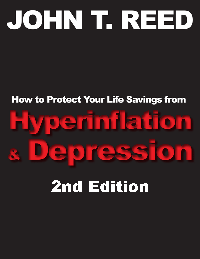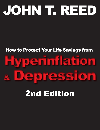Should you just throw up your hands at the probability of hyperinflation & depression? by John T. Reed

 |
$34.95 |
‘If that happens, we’re all finished anyway so why do anything about it?’
That is a common response I get to my new book How to Protect Your Life Savings from Hyperinflation and Depression and related articles I have written.
I guess that’s easier than taking steps to protect yourself and your family—at least until the ’flation hits the fan. When the ’flation hits the fan, nothing will be easy for those who did not protect themselves.
Denial
Throwing up your hands does not work, but it’s sure popular. It even has a well-established name: denial. People apply that technique to all sorts of things including terminal cancer diagnoses, the need to have health insurance, the need to get a good education, preventive maintenance on their car or house, dependence on alcohol or drugs, and failure to plan for retirement.
Denial is a defense mechanism identified by Sigmund Freud. In it a person is faced with a fact that is too uncomfortable to accept and rejects it instead, insisting that it is not true despite what may be overwhelming evidence—or that if it is true, it is so monstrous that nothing can be done so why bother. Anna Freud said denial is a mechanism of the immature mind, because it conflicts with the ability to learn from and cope with reality. Indeed.
The ’flations are not an asteroid collision
Monetary instability, better known as inflation and deflation, is not an asteroid collision. It’s kind of simple. You do not want to owe money in deflation and you do not want to own money in inflation. Plus you must remain liquid, that is, able to pay your bills when they come due, at all times to avoid disorderly liquidation of your assets. Disorderly liquidation results in your getting far less for your assets that you would if you had sold them in an orderly manner.
9-step action plan
The steps you need to take are a bit more complicated, but not rocket science. The last chapter of my book has a nine-step action plan. Having finished the book, I am now myself implementing my own recommended steps. I sold my S&P 500 index fund and my TIPs bonds and put the money in selected foreign currency savings accounts abroad.
Pre-bankruptcy planning
I met with a bankruptcy lawyer—as everyone should, not just those who are, or are about to go, bankrupt. We do not anticipate going bankrupt, but after you read book after book about the Great Depression, you figure out that no one who went bankrupt ever expected to. Also, there is a law against “fraudulent transfer in anticipation of bankruptcy.” That prohibits moving assets around to more advantageous configuration for you when you are about to lose a lawsuit or similar forecast able event. But pre-bankruptcy planning actions you took along those lines before you had any inkling you might go bankrupt are not “clawed back” through fraudulent-transfer suits. So that’s another reason why persons who are in good financial shape should consult a bankruptcy lawyer when bankruptcy seems the last thing they should be thinking about. If you do not do bankruptcy planning until you anticipate bankruptcy, it will be too late.
Unfortunately, few who do go bankrupt ever did the pre-bankruptcy planning that every responsible adult should do. That means making sure you minimize your non-dischargeable debts—those that bankruptcy does not wipe out like alimony, student loans, and taxes—and maximize the percentage of your assets that are covered by your state’s bankruptcy exemptions.
O.J. did not do pre-bankruptcy planning. He regretted that.
O.J. Simpson lost his house, but not his $25,000 a month NFL pension when he went bankrupt. Had he lived in Florida or Texas or a half dozen other states when he went bankrupt, he would not have lost his home equity. After he went bankrupt, he moved to Florida—probably because he belatedly learned that he would not have lost his home equity there. If you read my book, you will NOT be learning such things belatedly. The book has a chapter on pre-bankruptcy planning.
Bankruptcy is a common occurrence—including among people who never de reamed they would ever go bankrupt—during deflation, also known as depression. Bankruptcy also happens during high inflation if you have a lot of dollar-denominated assets and fixed income like an annuity or if you own a business but the federal government squeezes your profits out of existence with unevenly-applied wage and price controls—as they almost always do.
IRAs and 401(k)s
Speaking of O.J.’s pension, what about your IRA or 401(k) in hyperinflation or depression? If they are protected from bankruptcy in your state, think twice about taking money out to buy other assets or pay down debt. But if taking the money out, say, to pay down your home mortgage, can significantly lessen the probability that you will go bankrupt, it’s probably better to take the money out for that purpose. I am also speaking with a pension account expert to discuss the interaction between pensions, bankruptcy laws, inflation, and deflation.
5%+ yield and super safe passive investment
Want a passive investment that pays over 5% and is literally safer than U.S. government bonds?
Pay down your mortgage. 
If you pay down, say, a 5.375% mortgage, your yield on that investment will be 5.375%. Try getting that anywhere else nowadays on a safe investment. It is the same as if you purchased your own mortgage from the lender. They are earning 5.375% on it. So would you. Only for you it would take the form of not having to make monthly payments any more.
True, that converts the asset you had before to home equity and home equity can shrink, but you still have a place to live and that, not investment, is the main purpose of your home.
In 1929, the families of my mother and father were in about the same lower-middle income position. But by 1932, my mother’s family had lost everything and was having trouble finding work. My father’s family essentially did not notice the Depression. Why? My mother’s family lived in a row house in Philadelphia—a house that had a mortgage on it. They lost the house to foreclosure.
My father’s family did not pay down their mortgage before the stock market crash. They never had a mortgage to begin with. One of my ancestors was a lieutenant in the Revolutionary War. The nascent U.S. government had little money to pay Revolutionary War vets, but they did have land. (Ironically, the current U.S. federal government has neither.) So my ancestor the lieutenant got 500 acres in Virginia, now West Virginia. That is the farm my father lived on. Neither the game nor the well nor the outhouse nor the livestock nor the forest nor the vegetables nor the grains on that farm cared much about the deflation of the dollar during the 1930s. Chickens still laid eggs. Corn still grew. Pigs still got fat eating the grain grown on the farm. Trees still burned in the wood stove. My father’s family did not lose their jobs because they were self-employed.
That tale of two families illustrates the dramatic difference between owning the right assets and owning the wrong ones—and the dramatic difference between owing money and not owing money in a depression.
Now a hundred other readers just threw up their hands saying, “I’m not moving to a farm!”
Me neither. I do not recommend moving to a farm in my book. But I do note the value of self-reliance like having your own business, owning your home free and clear, owning pre-1965 U.S. dimes, quarters, and half dollars which, although hard assets (90% silver), are relatively liquid.
Apocalypse! Rioting in the streets! Human sacrifice, dogs and cats living together, mass hysteria!
Another variation I get is there is no point in planning for hyperinflation or depression because there will be rioting and looting. If a Big Mac costs $250,000 (which it will by the way if we get hyperinflation—literally) people who can’t afford one will kill you to steal yours.
No. As those who read my book know, during hyperinflation in Weimar Republic Germany in 1922, the poor sort of did okay. They live hand to mouth and that is inflation-virtuous in that hand to mouth is sort of indexed for hyperinflation. In other words, since they work for money rather than live off investments, as prices rise, their income, meager though it may be, also rises. If a Big Mac is $250,000, the minimum wage will be $500,000 an hour and welfare recipients will get $2 million a week or some such. Hyperinflation, folks, is a general rise in prices. That means all prices rise. The notion that only the prices of stuff you need will rise but the prices of your labor and hard assets will not is so pessimistic and devoid of understanding of the meaning of the word inflation that it boggles the mind.
However, if you are living off dollar-denominated assets like bank account or bond or certificate of deposit interest, you are totally screwed because those will not go up with inflation.
If anyone were going to riot during hyperinflation, it would be seniors receiving social security, annuitants, persons living off bank accounts and bonds. Will they be attaching torches and pitchforks to their walkers as they storm the Federal Reserve building?


The Apocalypse argument is just another excuse for denial and doing nothing to protect your family.
The truth is there are a number of things you can and should do for yourself and your family to survive hyperinflation & depression. But I learned when I coached over 900 athletes on 35 teams that you cannot coach the uncoachable. If a little bit of anxiety and change causes you to flip out and descend into mindless denial, you need a psychiatrist not a how-to book.